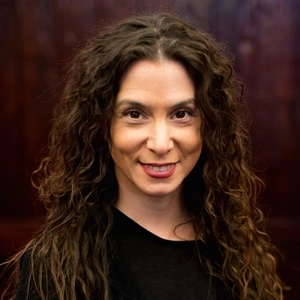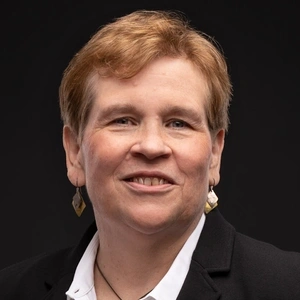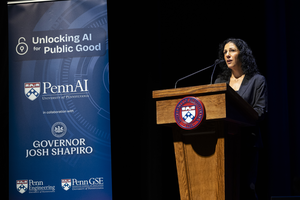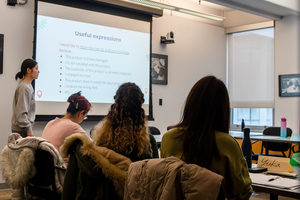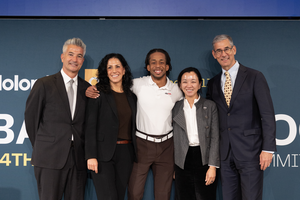Faculty Expert
-
Peter Eckel
Senior Fellow and Director of Leadership Programs, Penn AHEAD
Policy, Organizations, Leadership, and Systems Division
Peter Eckel
Governing Universities in Post-Communist Countries: From a Common Start, 1991–2021
While collaborating with researchers from Central Asia, Penn GSE Senior Fellow Peter Eckel and his colleagues found an unusual opportunity: comparing how universities in the former Soviet Union have evolved from their time under Communist rule to the present day.
Eckel’s new book, Governing Universities in Post-Communist Countries, published in October by Cambridge University Press, examines the varying university systems in former Soviet republics.
Since most colleges in Europe and North America were founded more than 100 years ago, Eckel said conducting short-term comparative research studies between institutions can be challenging.
In contrast, after the dilution of the Soviet Union in 1991, the former republics experienced a wide range of political and social change, including in higher education. That creates an opportunity to study changes in their higher education institutions and to analyze the schools.
“Part of the premise is in most places in the world, it is difficult to do comparative studies of governance because the history is so different,” he said. “The former Soviet republics were a natural laboratory. … Before 1991, they had the same governance model. We could look 30 years later to see how the models have evolved.”
According to Eckel, researchers found four models for university structure: Full Soviet-style government control, Western-style universities with distance from the government, and two hybrid systems — one with some government involvement but internal decision-makers, and another that includes internal and external participation. Both hybrid systems provide opportunities for civic and community involvement, Eckel noted.
“It is really about the degree of openness in university structures, and governance is one example of how open an institution is,” Eckel said.
Institutions with strong government control existed in countries with more authoritarian and centralized regimes, while Kazakhstan offered schools the civic and external style more typical of Western universities. Eckel said the number of schools following hybrid models of governance is growing.
“It was an interesting sign to see how some countries are rethinking the role of universities and who the key stakeholders should be for their direction,” he noted.
As Eckel and his colleagues continue to observe post-Soviet higher education, he said this publication will interest academics, administrators, board members, and university leaders who follow governance styles and make policy decisions.
Sharon Ravitch
Leadership Mindsets for Adaptive Change: The Flux 5
Even the most accomplished executives and practitioners can hone their leadership skills and become more effective, according to Penn GSE Professor of Practice Sharon Ravitch.
Ravitch’s latest book, Leadership Mindsets for Adaptive Change: The Flux 5, co-authored with Lisa Herzog, sets out to help individuals working in education, business, and nongovernmental organizations develop mindsets and build skills necessary to both lead and succeed.
The book, Ravitch’s eighth publication, guides readers through the Flux 5 mindsets: inquiry, humanizing, systems, entrepreneurial, and equity. Each chapter includes resources and exercises designed to build skills.
Ravitch said the Flux 5 is a highly adaptable framework, and she hopes to reach a broad audience across sectors, including educators, mid-career practitioners, nongovernmental organization leaders, business executives, and higher education managers interested in improving their skills.
The book, published in August, will appeal to K–12 educators as well. Ravitch said a group of superintendents and a California school district are reading the new publication for professional book clubs.
Ravitch hopes the book will push readers to “lead in ways that humanize and meet this moment,” which requires a “transformation of logic and norms that shape and guide organizations.”
She said the book’s concepts will resonate across industries and professions.
“Leaders are the architects of cultures,” Ravitch added.
Karen Weaver
Money, Power, Politics: What College Presidents Need to Know about College Athletics
As revenue from college athletics surpasses $1 billion, Penn GSE Adjunct Assistant Professor Karen Weaver is offering a crash course on the relationship between sports and higher education management, media, and policy.
Weaver’s upcoming book, Money, Power, Politics: What College Presidents Need to Know about College Athletics, will be published by Johns Hopkins Press in late 2024 or early 2025. It was inspired by a seminar she leads for college presidents and executives on the business of college sports.
“I realized there was a gaping hole in where senior campus leaders could gather info on college athletics,” said Weaver, whose first book, Sport Finance: Where The Money Comes From, And Where The Money Goes, was published in 2021.
Weaver noted that many university leaders come up through academic ranks and aren’t exposed to the complexities of college athletics, including athletic conference partnerships, marketing, budgets, TV deals, and managing student-athletes. She said many school leaders have historically deferred to athletic directors and their staffs, but Weaver said college sports are now too important — and profitable — to delegate to others.
“The premise of the book is there are so many landmines, and it’s important to be educated ahead of time so presidents can learn to ask the right questions,” Weaver said.
Weaver recommends college leaders meet regularly with athletics officials, including athletic directors, coaches, and staff, and survey student-athletes about their experiences and ideas.
While the book’s primary audience is university executives, Weaver said the book will appeal to anyone interested in college sports, including students, passionate fans, and scholars interested in high-level decision-making in college sports.
“Having a deeper understanding will show you the opportunities and threats,” Weaver said. “Sometimes [school leaders] do great listening, but they must also follow up with questions to get greater insights.”
Media Inquiries
Penn GSE Communications is here to help reporters connect with the education experts they need.

